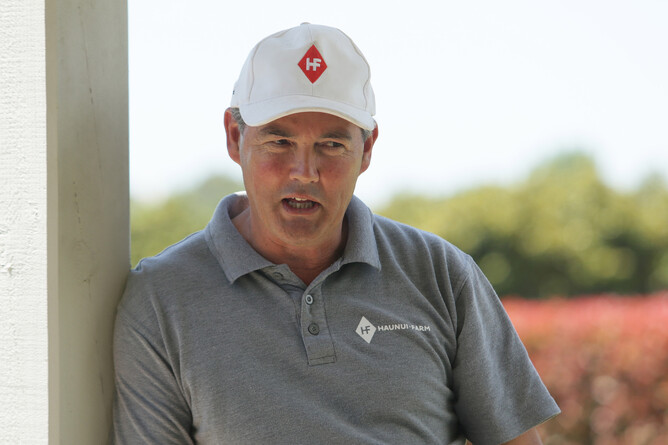The thoroughbred industry has been deemed an essential service due to horse welfare and is able to operate under restrictions during Covid-19 response Alert Level 4.
There is no map for navigating the uncharted waters of dealing with the impact of Covid-19 with industry participants using government guidelines and common sense to ensure staff and horse welfare is maintained.
Karaka-based Haunui Farm have been proactive in developing and implementing a response plan to ensure staff are safe and horses are cared for.
“This is unprecedented and it is governmental control that we have to abide by,” Haunui Farm managing director Mark Chitty said. “The great thing is that we have had good buy-in from our clients and our staff recognising we have to do things quite differently to what we would be doing at this time of year.”
“It is inclusive in that no one is immune from this and it is about trying to stay positive.”
The farm management team have identified essential operations and the best way to execute them.
“Obviously feeding, checking and the treatment of any injuries is essential,” Haunui Farm sales and marketing manager and NZTBA council member Shannon Taylor said.
“There will be some horses that are required to be stabled due to injury so it will be essential to deal with them appropriately like mucking out boxes, feeding and watering and giving them some exercise.”
With at least four weeks of nation-wide lock down ahead, Haunui have made arrangements with their staff to reduce interaction and potential exposure to Covid-19.
“We have split our staff into teams and have an on-farm team and an off-farm team,” Taylor said. “They will be doing seven days on seven days off.
“We will have to keep assessing the situation and how it is all working.
“We have had a good discussion about it and we are limiting people’s exposure but will still get those jobs done that need to be done and that clients are entrusting us to do.”
Taylor said they have also talked to staff about the importance of monitoring their health and adhering to self-isolation rules.
“They have to be really mindful of isolation and what it means, we have supplied latex gloves for everyone to use at petrol stations and supermarkets and are getting thermometers.”
The farm also has strict protocols in place for any outside suppliers who need to come on to the farm.
“We are very lucky that our main supplier NRM delivers feed on a truck and it is unloaded by our staff on a pallet and the truck driver won’t come into contact with anyone,” Taylor said.
The team at Haunui Farm are adamant that while they can do their best, it is up to each individual to act accordingly to reach the common goal of slowing the spread of Covid-19.
“It is about taking self-responsibility,” Taylor said. “We can control to a certain extent what our staff do at work. Outside of that we have tried to hammer home that if we do this for four weeks it will hopefully mean less time rather than extending it.
“We don’t want people to flaunt the rules.”
As a veterinarian, Chitty will be onsite to deal with any ailments and has an insight into the mechanics of a virus. He feels it is imperative people keep up the motivation to abide by the regulations especially when they don’t appear to be having any effect.
Haunui Farm has given as much information to their staff as possible on Covid-19 and the reasons for the extreme measures to be taken over the coming weeks.
“You have to have an understanding of Covid-19 to understand why the government is doing what it is doing,” Chitty said. “It is actually going to get worse before it gets better and so there is going to be a thought process of ‘what is the use of lockdown if it is getting worse’ which it will, especially over the first week.
“You have to maintain the motivation that you are doing the right thing. I think things might improve after the end of the second week and quite quickly thereafter.
“I am anticipating that it will go on longer that four weeks because of what we have seen with the metrics of what the disease does.
“We have explained that to staff and that is important so you get the buy-in that we are all in this together.
“We have reassured our clients. A lot of ours are city-based and can’t take their horses home and are relying on us to do the right thing. Horses are a living being and we will do our best to maintain the standard of care that they are accustomed to.”
Chitty also urges others to use their available support networks to maintain a positive mindset and help each other through these difficult times.
“At this time talking to colleagues and people you respect is important,” he said.
“There will always be someone on the end of a phone to talk through issues.
“Everyone will have their own support networks and it is important to utilise them.” -Amie Best, NZTBA


